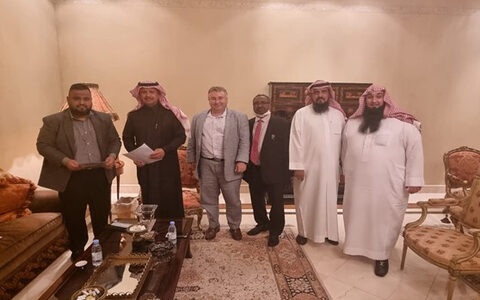EV Metals Arabia, a subsidiary of EV Metals Group (EVM), has signed a deal to develop a lithium-ion battery materials production plant in the Kingdom of Saudi Arabia.
The front-end engineering design (FEED) agreement is for a lithium hydroxide monohydrate (LHM) plant that is in development by EV Metals.
The Lithium Chemicals Plant will be designed to process spodumene concentrate containing 6% lithium oxide (SC6) imported from upstream spodumene concentrators in Western Australia.
Construction of the first two trains of LHM production plants is scheduled to commence in Q1 next year with commissioning scheduled for the second half of 2024.
The FEED agreement is with Mustang and Faisal Jameel Al Hejailan Consulting Engineering Company, a subsidiary of British multinational engineering and consulting firm John Wood Group.
Under the FEED agreement, the work will focus on the non-process infrastructure, utilities and port infrastructure.
EVM plans to build a battery chemicals complex following a conditional investment agreement between the Royal Commission for Jubail and Yanbu and EV Metals Arabia last October.
The integrated battery chemicals complex at Yanbu Industrial City will produce high purity chemicals containing lithium, nickel, cobalt, manganese and other metals and cathode active materials used in rechargeable lithium-ion batteries.
Abdullah Busfar, chairman of EVM, said the first two facilities of LHM production would bring in an initial investment of $800 million.
The facilities will produce 50,000 tpa of LHM for original equipment manufacturers, principally electric vehicle manufacturers and battery cell manufacturers.
Saudi Arabia materials supply
Last year, Australia-based Avass Group signed an MoU with HRH Prince of Saudi Arabia to jointly manufacture electric vehicles and lithium batteries to assist the trade relationship between Saudi Arabia and India.
The agreement bolstered Australia-based Avass’ plans to mass manufacture full electric buses and lithium batteries in Saudi.
Dr. Allen Saylav, group chief executive officer at Avass said at the time that the agreement would greatly assist the trade relationship between Saudi Arabia and India and help Avass to provide an integrated solution for EV batteries.
Saudi Arabia has announced that at least 30% of the cars in its capital would be electric by 2030.












